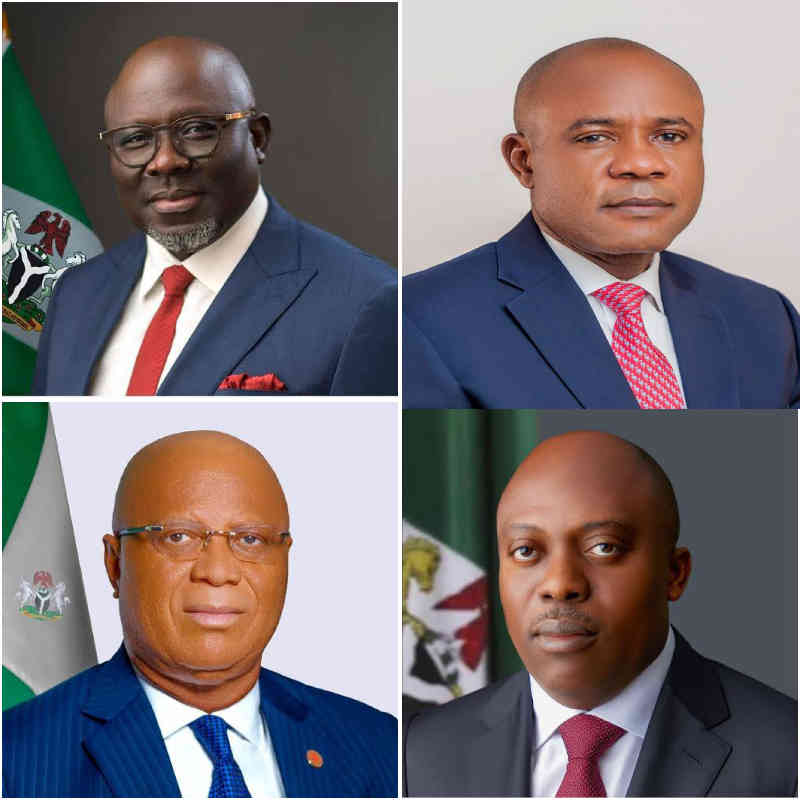
Four PDP Governors to Defect to APC, Back Tinubu’s Second-Term Bid – Report
- Advertisement -
Four PDP Governors Reportedly Set to Defect to APC in Support of President Tinubu’s Second Term Bid.
Abuja, Nigeria — In a major political twist that could redefine Nigeria’s power dynamics ahead of the 2027 general elections, four governors elected on the platform of the Peoples Democratic Party (PDP) are reportedly considering defection to the ruling All Progressives Congress (APC) to support President Bola Ahmed Tinubu’s second term ambition.
According to ThisDay, the governors in question are:
- Advertisement -
- Governor Umo Eno of Akwa Ibom State
- Governor Sheriff Oborevwori of Delta State
- Governor Peter Mbah of Enugu State
- Governor Siminalayi Fubara of Rivers State
The report indicates that these governors have begun holding strategic consultations with high-ranking APC stakeholders and Presidency officials. Their planned defection is reportedly rooted in a combination of political alignment, national interest considerations, and state-level calculations.
Also Read : Bauchi Deputy Governor SLAPS Foreign Minister at Emir’s Palace – Eyewitnesses Reveal Why
- Advertisement -
Why the Defection Matters
If confirmed, this development will mark a significant blow to the PDP, Nigeria’s main opposition party. The possible defection of four sitting governors would not only weaken the PDP’s influence in the South-South and South-East regions but would also boost the APC’s legitimacy and strength ahead of the next presidential election.
Analysts say the defection could signal the further erosion of opposition coordination, especially as the PDP continues to grapple with internal divisions and leadership crises following the 2023 general elections.
- Advertisement -
Political Realignments in Southern Nigeria
All four governors hail from key oil-producing states in the South-South and South-East zones, which traditionally serve as the PDP’s strongholds. Their shift toward the APC, if realized, may influence voting patterns and grassroots political allegiance across the regions.
Governor Umo Eno of Akwa Ibom has so far maintained cordial relations with the Tinubu-led Federal Government despite political differences. He recently commended the President’s intervention in the state’s development needs, a gesture many view as a soft landing ahead of a political realignment.
Delta State’s Governor Oborevwori, likewise, has made cautious moves to engage with federal authorities, particularly on fiscal matters and infrastructure projects, signaling a possible pivot toward the ruling party.
Enugu State Governor Peter Mbah has also been lauded for his pro-business stance and his outreach to foreign investors, with backing from Abuja reportedly facilitating some of these initiatives.
- Advertisement -
In Rivers State, the situation is even more complex. Governor Siminalayi Fubara, who has been locked in a political battle with his predecessor and political godfather, Nyesom Wike (now an APC minister), is said to be exploring defection as a strategy to secure political survival and consolidate power amid the ongoing crisis.
Presidency’s Strategy to Secure 2027
Observers believe that the Tinubu administration is strategically courting opposition governors to build a broader national coalition in advance of 2027. President Tinubu, who assumed office in May 2023, has faced early challenges ranging from economic reforms and fuel subsidy removal to currency devaluation and public discontent.
However, the President’s political team appears determined to expand APC’s reach, particularly in opposition-held regions, in what insiders describe as a “Southern consolidation strategy” to neutralize potential challengers and secure a second term.
PDP Under Pressure
This latest development comes at a time when the PDP is struggling to present a united front. The party has faced internal wrangling over leadership roles, the zoning of key positions, and accusations of weak opposition to the APC-led government.
Political experts say that unless the PDP quickly addresses these internal issues, the party risks hemorrhaging more of its elected officials and critical support base to the ruling APC.
Reactions and Speculations
While none of the governors has officially confirmed the planned defection, sources close to the corridors of power say discussions are at advanced stages. The APC national leadership has remained tight-lipped, neither confirming nor denying the reported moves.
Political watchers are, however, not surprised by the unfolding drama. A former PDP national officer who spoke anonymously stated:
“This is what happens when a party fails to reform and reward loyalty. Many of our governors are beginning to feel abandoned, and the APC is offering them visibility and federal support.”
Implications for 2027
Should the defections materialize, it would dramatically alter the 2027 electoral map. With governors wielding significant influence over state structures and electoral processes, their movement to the APC could pave the way for Tinubu’s reelection strategy.
It could also mean the consolidation of federal and state-level power in strategic oil-rich regions — a scenario that may marginalize opposition efforts and diminish checks and balances in Nigeria’s fledgling democracy.
Editor’s Note
The political chessboard in Nigeria is in motion once again, and all eyes are on these four governors as the nation inches closer to another critical electoral cycle. Whether for political survival, policy alignment, or power consolidation, the possible mass defection from PDP to APC could mark a turning point in Nigeria’s democratic journey.
TJ News Nigeria will continue to monitor this developing story. Stay with us for verified updates.
- Advertisement -

